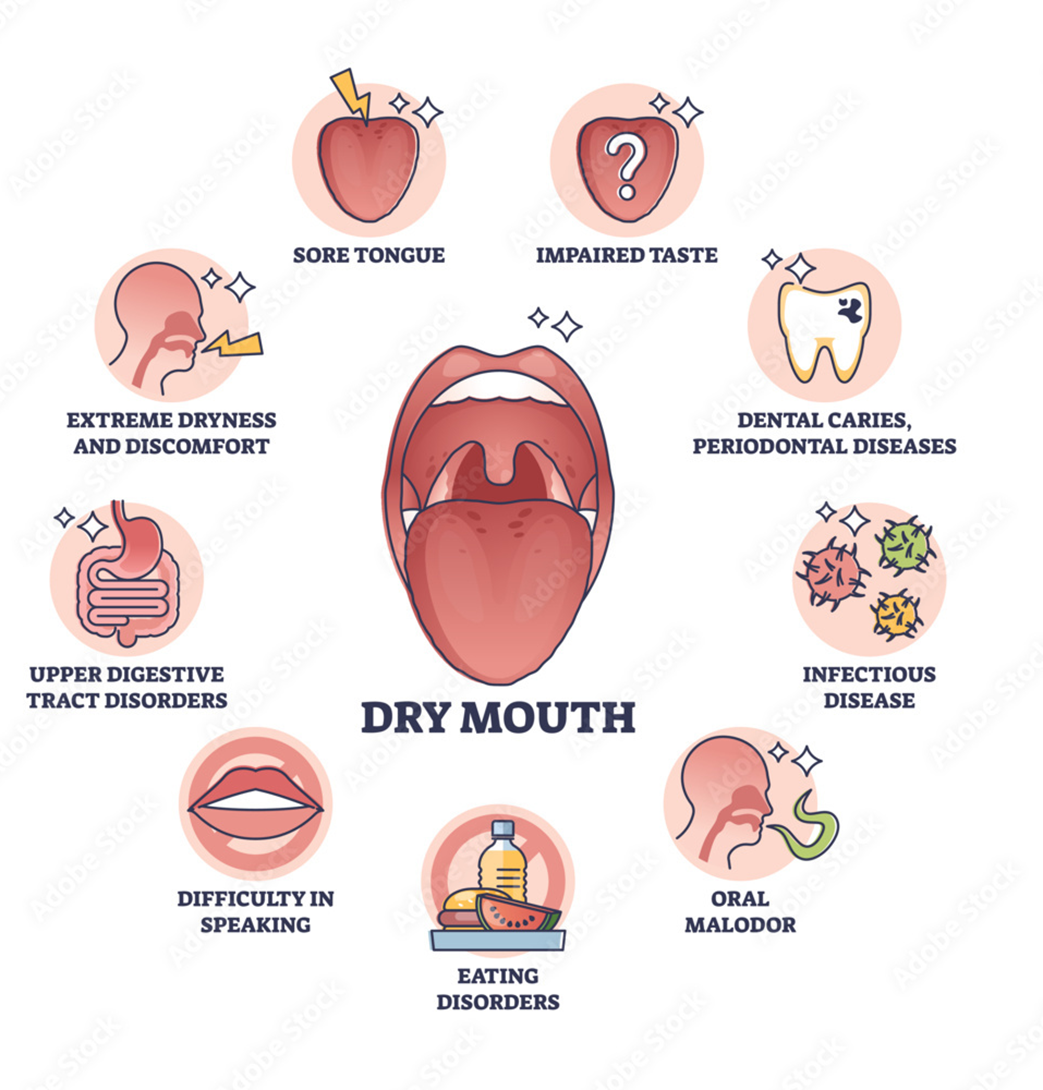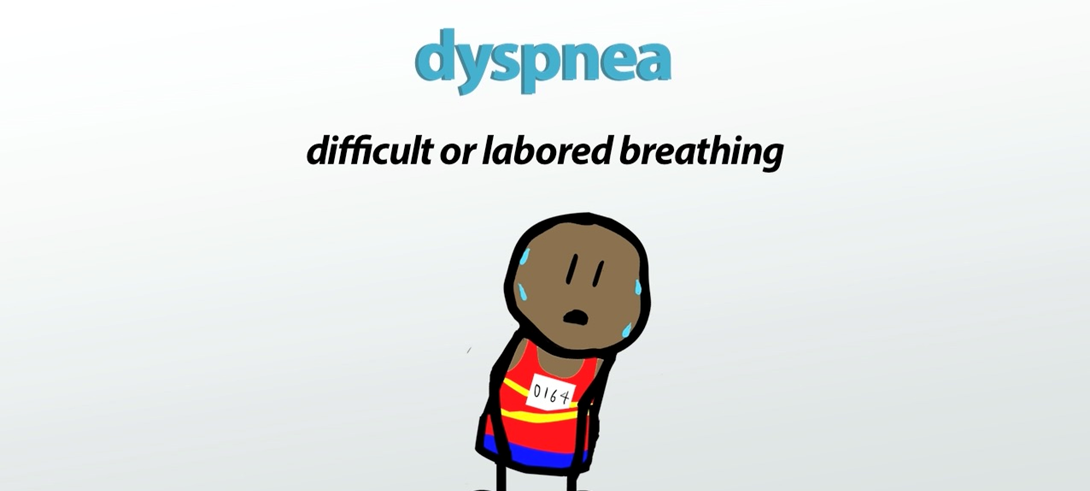An older adult reports symptoms of xerostomia. Which of the following interventions should the nurse implement for this patient? (Select all that apply.)
Provide antiseptic mouthwash (such as Listerine) for the patient.
Encourage the patient to brush and floss teeth regularly.
Encourage the patient to drink water frequently.
Provide saliva substitutes.
Correct Answer : B,C,D
Choice A reason: This is incorrect because providing antiseptic mouthwash (such as Listerine) for the patient can worsen xerostomia, or dry mouth. Antiseptic mouthwash can contain alcohol, which can dry out the oral mucosa and reduce saliva production. Saliva is important for lubricating the mouth, preventing infections, and facilitating chewing and swallowing. Therefore, antiseptic mouthwash should be avoided or used sparingly in patients with xerostomia.
Choice B reason: This is correct because encouraging the patient to brush and floss teeth regularly can help prevent dental caries, gingivitis, and periodontitis, which are common complications of xerostomia. Xerostomia can increase the risk of oral infections and tooth decay, as saliva helps wash away food particles, bacteria, and plaque. Therefore, oral hygiene is essential for patients with xerostomia.
Choice C reason: This is correct because encouraging the patient to drink water frequently can help moisten the mouth and relieve the discomfort of xerostomia. Water can also help flush out food debris and bacteria, and prevent dehydration, which can exacerbate xerostomia. Therefore, water intake is beneficial for patients with xerostomia.
Choice D reason: This is correct because providing saliva substitutes can help mimic the functions of natural saliva and improve the symptoms of xerostomia. Saliva substitutes are artificial saliva products that contain water, electrolytes, and lubricants, such as glycerin, carboxymethylcellulose, or xylitol. They can be applied as sprays, gels, rinses, or lozenges, and can help lubricate the mouth, prevent infections, and facilitate chewing and swallowing. Therefore, saliva substitutes are useful for patients with xerostomia.

Nursing Test Bank
Naxlex Comprehensive Predictor Exams
Related Questions
Correct Answer is C
Explanation
Choice A reason: FACE pain rating scale is not the most useful assessment tool for a cognitively impaired patient who cannot accurately report pain, as it relies on the patient's ability to match their pain intensity to a series of facial expressions. The patient may not be able to understand or use the scale appropriately.
Choice B reason: OLDCART-based assessment tool is not the most useful assessment tool for a cognitively impaired patient who cannot accurately report pain, as it relies on the patient's ability to provide detailed information about the onset, location, duration, characteristics, aggravating factors, relieving factors, and treatment of their pain. The patient may not be able to recall or communicate this information effectively.
Choice C reason: PAINAD scale is the most useful assessment tool for a cognitively impaired patient who cannot accurately report pain, as it relies on the nurse's observation of the patient's behavior and physiological responses to pain. The scale consists of five items: breathing, vocalization, facial expression, body language, and consolability. Each item is scored from 0 to 2, and the total score ranges from 0 to 10. A higher score indicates more pain.
Choice D reason: 0 to 10 numeric pain scale is not the most useful assessment tool for a cognitively impaired patient who cannot accurately report pain, as it relies on the patient's ability to rate their pain intensity on a scale from 0 (no pain) to 10 (worst possible pain). The patient may not be able to comprehend or use the scale correctly.
Choice E reason: None of the above is not the correct answer, as there is one choice that is the most useful assessment tool for a cognitively impaired patient who cannot accurately report pain.
Correct Answer is ["B","C","D","E"]
Explanation
Choice A reason: Determining coughing frequency is not a reliable way to assess whether the client has adhered to prescribed therapy, as coughing can have various causes and may not be related to heart failure or its treatment.
Choice B reason: Checking for peripheral edema is a useful way to assess whether the client has adhered to prescribed therapy, as peripheral edema is a common sign of fluid retention and worsening heart failure. If the client has been taking diuretics as prescribed, the edema should be reduced or absent.
Choice C reason: Auscultating the lungs bilaterally is a helpful way to assess whether the client has adhered to prescribed therapy, as lung sounds can indicate the presence or absence of pulmonary congestion and crackles, which are signs of fluid overload and worsening heart failure. If the client has been taking medications to improve cardiac function and reduce fluid volume as prescribed, the lungs should be clear or improved.
Choice D reason: Assessing diet over the last 48 hours is a relevant way to assess whether the client has adhered to prescribed therapy, as diet can affect fluid and sodium intake and retention, which can worsen heart failure. If the client has been following a low-sodium and fluid-restricted diet as prescribed, the risk of fluid overload and dyspnea should be lower.
Choice E reason: Comparing current weight to baseline is an important way to assess whether the client has adhered to prescribed therapy, as weight can reflect fluid status and changes in heart failure condition. If the client has been taking medications and following dietary recommendations as prescribed, the weight should be stable or decreased.

Whether you are a student looking to ace your exams or a practicing nurse seeking to enhance your expertise , our nursing education contents will empower you with the confidence and competence to make a difference in the lives of patients and become a respected leader in the healthcare field.
Visit Naxlex, invest in your future and unlock endless possibilities with our unparalleled nursing education contents today
Report Wrong Answer on the Current Question
Do you disagree with the answer? If yes, what is your expected answer? Explain.
Kindly be descriptive with the issue you are facing.
